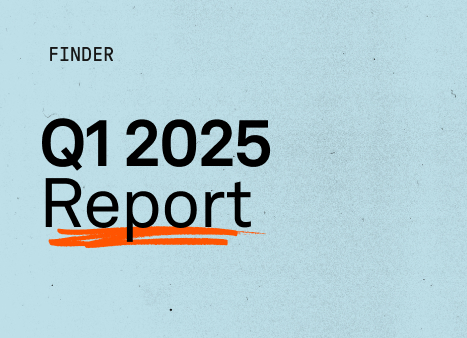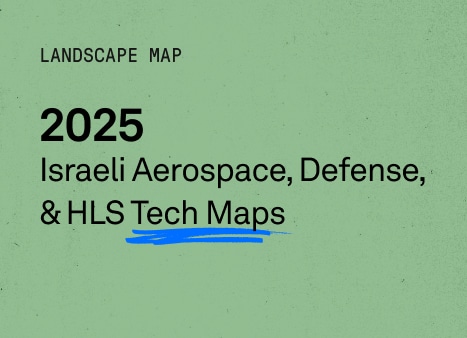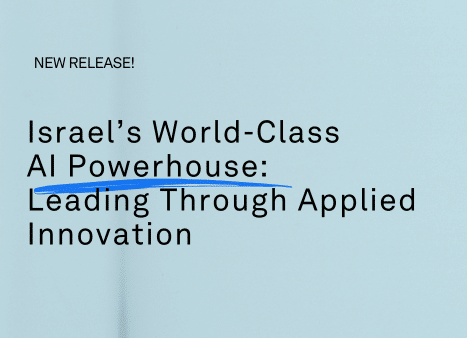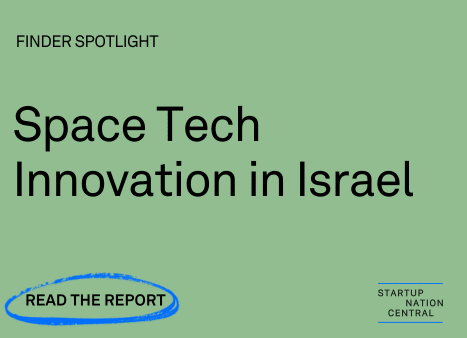2025 Landscape Map Energy Tech
Research and Insights: Maor Perlov, Senior Data Specialist, Startup Nation Central
Business Analysis: Gary Soleiman, Global Partnerships, Startup Nation Central, Shon Dana, CEO, Ignite the Spark, and Hila Lipman, Director of Business Development for Climatetech, Israel Export Institute
Editor: Yariv Lotan, VP of Product and Data, Startup Nation Central
Ecosystem Contributors:



Introduction
Israel’s energy technology ecosystem is maturing rapidly, with over 350 companies now active across the energy sector and $400+ million raised in the last year alone. Startup Nation Central, in collaboration with Ignite the Spark and the Israel Export Institute, produce an annual Energy Tech Landscape Map to highlight the breadth and depth of the Israeli energy tech ecosystem
The landscape map segments innovation into eight key subsectors: Energy Generation, Energy Storage, Behind-the-Meter, Grid Infrastructure (Transmission & Distribution), Hydrogen, Cybersecurity (OT systems), Carbon Capture & Storage (CCUS), and Waste-to-X.

Global Energy Outlook: The Race to Decarbonize and Decentralize
Across the globe, the energy landscape is undergoing a profound transformation, driven by climate urgency, technological progress, and geopolitical realignment. From generation to consumption, systems are becoming cleaner, smarter, and more resilient to transition and are being shaped by innovation, regulation, and redefined global alliances.
Clean Energy Scaling & Global Shifts
Accelerated Deployment & Global Trade
Clean energy generation is expanding at scale. Ambitious projects like the Xlinks Morocco–UK HVDC link, designed to transmit 11.5 GW of solar and wind power across continents, represent a new era of cross-border renewable trade. Meanwhile, China’s dominance in solar and wind manufacturing is prompting the U.S. and EU to boost domestic production through policy initiatives like the Inflation Reduction Act (IRA) and the Net-Zero Industry Act.
Market Response and Maturation
As technologies mature, market fit becomes clearer. Hydrogen is now seen as most viable for heavy industry, shipping, and aviation. Meanwhile, Sustainable Aviation Fuels (SAF) are gaining traction globally, including in Israel’s decarbonization roadmap.
Energy Storage & Grid Modernization
Battery Growth & Technology Diversification
Global battery installation hit 205 GWh in 2024, a 53% year-over-year increase. Systems exceeding 100 MWh are becoming the norm. While lithium-ion remains dominant, momentum is building around thermal storage, metal-air batteries, and next-gen chemistries, all essential for long-duration, grid-scale storage.
Smart, Flexible, and Resilient Grids
Power grids are being reengineered to meet electrification surges, bi-directional flows, and climate-related disruptions. Innovation in smart substations, dynamic load balancing, and AI-driven optimization are pivotal. Major investment in transmission and digital infrastructure are underway in the U.S. and Europe, with a goal of completion by 2035.
AI and the Datacenter-Energy Nexus
AI as an Enabler
AI is emerging as a catalyst for smart grid management, sustainable mining, predictive maintenance, and real-time system analytics. Energy players are embedding AI across operations to improve efficiency and resilience.
Energy-Hungry Datacenters
The exponential growth of AI has made datacenters major energy consumers. Decarbonizing these facilities is driving adoption of clean, co-located power sources like geothermal and nuclear, along with next-gen computing architectures such as quantum, neuromorphic, and photonic computing. Advanced cooling techniques such as liquid immersion and direct-to-chip are also on the rise.
Geopolitical Realignment & Regulatory Complexity
Energy Security and Regionalization
Global trade patterns are fracturing. With the U.S. imposing sweeping tariffs and China cementing clean tech leadership, countries are pivoting to energy independence. Investment is flowing into supply chain resilience, critical minerals, and strategic partnerships.
Policy Recalibration
The incumbent U.S. administration is shifting from climate branding to “energy dominance,” supporting fossil fuels alongside nuclear and geothermal. Though some IRA and BIL provisions have been repealed, significant funding remains, rewarding alignment with the revised energy narrative.
ESG Deprioritized, but Regulation Advances
Multinational ESG agendas are softening, but policy momentum continues. In Europe, frameworks like CBAM and ETS are creating new business opportunities for startups targeting hard-to-abate sectors.
Defense-Linked Innovation
As national budgets prioritize defense, dual-use technologies that serve both military and civilian energy needs are gaining attention and investment.
New Business Models & Blended Finance
Blended Capital for Energy Tech
An increasingly diversified investor base is coalescing around energy transition. Venture capital, private equity firms, banks, and philanthropic donors are engaging in blended finance, helping de-risk and scale capital-intensive technologies.
Energy-as-a-Service (EaaS)
Business models are shifting from ownership to service-based solutions. EaaS offerings for energy supply, optimization, and management are gaining momentum, especially among commercial and industrial users seeking flexibility and efficiency.
Behind-the-Meter Disruption & Decentralization
EV Growth & Consumer Empowerment
In 2024, over 17 million electric vehicles were sold globally, representing 20% of all new car sales. Consumers are adopting smart charging, vehicle-to-grid (V2G) technologies, dynamic pricing, and rooftop solar-plus-storage. In South Australia, consumer-owned solar already supplies most midday electricity, providing a preview of future decentralized grids.
Decentralized Grid Futures
These trends signal the rise of a consumer-driven energy system, where homes, vehicles, and businesses function as active grid participants, enabling local flexibility and self-sufficiency.
Emerging Technologies
Sustainable Aviation Fuels (SAF)
Sustainable Aviation Fuels (SAF) are gaining traction globally as airlines, regulators, and fuel producers seek viable alternatives to fossil-based jet fuel. While still early in deployment, SAF is one of the fastest-growing areas in climate-aligned energy tech bolstered by international mandates, corporate demand, and emerging production pathways.
Waste-to-Energy and Renewable Natural Gas (RNG)
Circular economy solutions are expanding rapidly. Countries are investing in anaerobic digestion, landfill gas capture, and modular waste conversion. Europe and Japan lead in mature infrastructure, while RNG is scaling as a low-carbon substitute for fossil fuels.
Global Perspective by Nick Butler

Energy Economist | Former Group Vice President, Strategy & Policy Development at BP Visiting Professor, King’s College London | Founding Chair, King’s Policy Institute Former Senior Policy Adviser to UK Prime Minister Gordon Brown
As global energy markets reel from geopolitical shifts, economic volatility, and the growing demands of industrial electrification, one imperative becomes clear: resilience and adaptability must guide both innovation and investment.
We are entering an era shaped less by long-range, capital-intensive bets like hydrogen and CCUS and more by deployable, cost-reducing solutions that deliver impact in the near to mid term. Founders should pivot their focus toward low cost and low carbon technologies that enhance system efficiency: intelligent grid solutions, AI-powered consumption optimization, energy storage, infrastructure inspection and monitoring for oil and gas fields, and cybersecurity for critical infrastructure.
Wind energy is increasingly seen as a secure source of supply because it’s local. The real challenge lies in potential supply chain disruptions. Many countries still depend on turbines imported from China. Shifting to more localized production could mitigate this risk. If that shift can happen at a reasonable cost, I think we’ll see continued wind development not necessarily in the U.S., but certainly in Europe, China, India, and other regions.
For investors, the signal is just as strong. Grid modernization, subsea or compressed air storage, rare-earth alternatives, and long-distance HVDC power transmission (as exemplified by projects like Morocco-to-UK interconnectors) offer attractive long-horizon returns. Crucially, these solutions also reflect a strategic shift away from dependence on Chinese supply chains, a trend likely to intensify.
Startups must resist the temptation of operating in technical isolation. Success lies in embedding solutions directly into existing corporate ecosystems, forming early, durable partnerships with end users, integrators, and service companies. In my experience, innovation becomes valuable only when it meets real, identified demand. Understanding how your solution lowers costs or enables scalability for a corporate partner is paramount.
Israel’s energy tech sector holds unique advantages: its fusion of cybersecurity, AI, and industrial innovation positions it to thrive in the urgent global push for low-cost, low-carbon, high-resilience technologies. Israeli companies must now scale those capabilities with precision, targeting infrastructure, materials, and storage challenges that dominate corporate agendas.
The next decade won’t reward speculative moonshots; it will reward those who enable smarter use of existing capacity, lower volatility, and build resilient systems. Founders should frame their value around enabling that future. Investors should back those who can scale it.
Local Energy Tech Ecosystem Outlook
Israel’s energy tech sector is growing steadily. There are currently over 350 active tech companies in Israel developing energy tech solutions, growing by nearly 60% over the past decade. Since the beginning of 2024, 26 new companies have been founded.
Number of Active Companies
Compared to last year’s map, our expanded definition of Energy Tech now includes more companies that align with the sector’s key focus.
The landscape includes companies with an Energy Tech core focus as well as companies that apply energy-related technologies as a key use case within broader domains such as agritech, industrial technologies, and automotive innovation. This growing convergence of sectors highlights the depth and versatility of Israel’s tech ecosystem and its ability to drive transformative innovation across the energy value chain.
Signs of Maturity Amid Startup Momentum
While early-stage companies still represent the majority, the data also points to a level of maturity within the ecosystem. Over one-third of companies (35%) have reached advanced stages classified as mature, public, or acquired. This indicates that many ventures are not only surviving the early growth phase but are successfully scaling, securing exits, or sustaining long-term operations. At the same time, the strong presence of early and late growth companies (65%) reflects a healthy pipeline of innovation, poised to feed the next generation of mature players.
The coexistence of both early momentum and established maturity highlights a balanced ecosystem that offers opportunities for immediate partnership and investment, while still holding long-term growth potential
Number of Companies by Stage
Robustness in Private Funding
From 2014 to 2023, Energy Tech startup funding consistently stayed ahead of overall ecosystem funding trends, capturing a larger share of private investment during growth years and experiencing smaller declines in downturns.
This reflected greater year-over-year stability and resilience. However, 2024 marked the first year Energy Tech funding trailed the broader ecosystem’s recovery. Funding in the first half of 2025 is already approaching nearly half the levels seen in 2023 and 2024, suggesting early signs of a potential recovery though it remains too early to confirm a sustained shift
Private Funding
Local Perspective by Shmuel Kedmi

CEO, NetZero Ventures
Israel stands at a unique crossroads in global energy innovation. While the local market is small, the depth of scientific expertise and entrepreneurial drive is vast. Over the past decade, Israel has cultivated an ecosystem where hard science converges with startup culture, and that convergence is now producing technologies with global impact.
The country’s strengths lie in deep tech domains like advanced materials, electrochemistry, thermodynamics, and solid-state physics. There is growing momentum in geothermal energy, next-generation heat exchangers, and hydrogen solutions, which promise meaningful contributions to global decarbonization. Companies such as Ormat and SolarEdge showcase how Israeli innovation is scaling to address real-world energy challenges.
Israeli founders bring more than ambition, they bring decades of academic and technical experience. Many hold PhDs and have transitioned into entrepreneurship with the maturity to tackle complex, long-cycle problems where success demands years of scientific validation.
The world is facing a historic surge in electricity demand, driven by electric vehicles, AI-powered data centers, and the rise of middle classes across Asia. With global consumption expected to rise by 50% by 2050, this demand wave presents a once-in-a-generation opportunity for innovative, scalable solutions. Israeli startups, known for their agility and scientific edge, are well-positioned to contribute meaningfully.
Strategically, Israel excels in areas like energy conversion, energy storage systems, heat conduction, and embedding AI capabilities into mechanical designs. In these areas, scientific creativity can outpace legacy constraints and unlock global potential.
For investors, the message is clear: look for ventures grounded in a clear understanding of their market, offer cost-effective solutions, and have a roadmap for international scaling. Israel’s innovation economy thrives when scientific rigor meets market-focused execution, and that’s where the next energy breakthroughs will come from.
Mapping the Energy Tech Landscape
Startup Nation Central, in collaboration with Ignite the Spark and the Israel Export Institute, produces an annual Energy Tech Landscape Map to highlight the breadth and depth of the Israeli energy tech ecosystem. The 2025 map features 165 innovative companies developing solutions across the energy tech value chain. For more information about our selection process please see the methodology section.
The map is organized by subsectors for a curated overview of Israel’s energy tech ecosystem. It serves as a guide for investors, corporate leaders, and global partners to identify active companies, find relevant decarbonization technologies, and track sector momentum.
Beyond this high-level categorization, each company also offers a more detailed set of use-case-specific solutions. These can be viewed by switching from Landscape view to Watch List view, where the Notes column contains the full breakdown of specialized offerings.

Explore the Landscape Map
Israel’s Energy Tech Ecosystem Subsectors
The landscape includes companies with an Energy Tech core focus as well as companies that apply energy-related technologies as a key use case within broader domains such as agritech, industrial technologies, and automotive innovation. This growing convergence of sectors highlights the depth and versatility of Israel’s tech ecosystem and its ability to drive transformative innovation across the energy value chain.
Energy Generation
Israel’s energy generation sector is advancing a diverse mix of renewable and next-generation technologies. SolarEdge leads globally in PV electronics, BrightSource Energy developed advanced CSP systems, and Ormat Technologies is a major force in geothermal energy. Startups like Apollo Power (flexible solar films) and Eco Wave Power (wave energy) demonstrate innovation in harvesting alternative resources.
A new wave of companies is exploring unconventional generation methods. WatAirGy uses accelerated water evaporation for off-grid power. nT-Tao is developing compact fusion technology. Exency applies thermochemical conversion for efficient microturbine electricity. ElectricAlgae harnesses bioelectricity from macroalgae. Supporting technologies include Agri-PV, solar O&M platforms, panel optimization tools, and monitoring systems for gas, diagnostics, and performance testing.
Israeli companies are also targeting renewable heat, thermal generation, biofuels, and early-stage nuclear approaches like cold fusion and SMRs. These technologies provide pathways for low-emission, high-density energy in the long term.
Energy Storage
To support renewable integration and energy flexibility, Israeli startups are delivering innovative storage solutions. StoreDot is developing ultra-fast lithium-ion batteries for EVs. Addionics enhances battery capacity and lifespan with 3D electrode designs. Phinergy leads in aluminum and zinc-air batteries for mobile and emergency use. Brenmiller Energy offers high-temperature thermal storage for industrial steam applications.
Beyond hardware, startups are building intelligent energy management systems that enable real-time control, grid stability, and demand optimization essential tools as storage becomes central to the clean energy transition.
Grid Infrastructure (Transmission & Distribution)
Israeli companies are driving the digital transformation of grid infrastructure with technologies that enhance visibility, resilience, and control. mPrest provides digital twin-based grid management rooted in Iron Dome defense software. Prisma Photonics uses fiber-optic sensing and AI to detect real-time anomalies in high-voltage lines. Exodigo offers AI-powered subsurface mapping to locate underground utilities with high precision. Remot delivers analytics and monitoring platforms for distributed grid assets.
Complementary innovation spans microgrids, renewable forecasting, DCM platforms, and smart EV charging integration.
Behind-the-Meter Innovation
Israeli energy tech companies are delivering intelligent energy solutions across residential, commercial, and industrial settings. Electreon is piloting wireless EV charging roads. Augury applies AI to monitor and maintain industrial equipment. ZutaCore provides liquid cooling systems for energy-efficient data centers. Oasix develops smart building energy optimization platforms. CaPow enables continuous wireless power delivery for mobile robotics and logistics operations.
Hydrogen Solutions
Israeli innovation is advancing technologies in hydrogen generation, storage, and utilization. H2Pro is developing E-TAC electrolysis for efficient hydrogen production. Nitrofix focuses on electrochemical green ammonia as a hydrogen carrier. Hydrolite creates on-demand hydrogen systems using solid-state materials, designed for safe, portable use. Together, these companies reflect a growing ecosystem for decentralized hydrogen deployment.
Waste-to-X
Israeli startups are pioneering waste-to-energy and circular economy solutions. HomeBiogas builds small-scale systems converting organic waste into cooking gas and fertilizer. Co-Energy designs modular plants that process mixed waste into electricity, hydrogen, and biochar. SGTech improves anaerobic digestion with higher energy yields and less sludge. Other ventures are producing sustainable fuels, synthetic feedstocks, and renewable gas from waste materials.
Carbon Capture, Utilization & Storage (CCUS)
Israel’s CCUS ecosystem is emerging with modular, energy-efficient approaches. RepAir develops electrochemical DAC systems with lower energy use. CarbonBlue focuses on ocean-based CO₂ capture from seawater. Additional startups are exploring carbon mineralization, utilization, and offset infrastructure.
Operational Technology (OT) Cybersecurity
With deep cybersecurity roots, Israel is securing critical energy systems. Claroty offers industrial-grade threat detection and network visibility. SaiFlow provides cybersecurity and operational monitoring solutions tailored for distributed energy resources (DERs) and electric vehicle (EV) charging infrastructure. These tools are essential as DERs, smart grids, and IoT-connected assets become central to modern energy infrastructure.
Notable 2025 Energy Tech Rounds
The following table highlights Energy Tech companies that secured private funding over the past year. The top 3 include:
Augury is applying AI-driven solutions to enhance energy technology within industrial operations. Their platform integrates advanced sensors and artificial intelligence to monitor machine health and optimize processes, enabling energy-intensive industries to reduce waste, improve efficiency, and lower emissions. By analyzing real-time data, Augury’s technology predicts equipment failures before they occur, minimizing downtime and conserving energy.
Wi-Charge is pioneering long-range wireless power delivery using infrared light. Their AirCord™ technology transmits focused beams of invisible infrared light from a ceiling- or wall-mounted transmitter to a photovoltaic receiver embedded in devices. This enables safe, efficient wireless charging over distances up to 30 feet, eliminating the need for cables or frequent battery replacements.
- RepAir has developed an electrochemical system inspired by battery and fuel cell technologies, enabling CO₂ capture from ambient air using only electricity—without the need for heat, water, or chemical solvents. This fully electric process consumes approximately 70% less energy than traditional carbon capture methods, making it both cost-effective and environmentally sustainable.
Notable Exits
The following table lists the notable exits (M&As and IPOs) since 2020. A few highlights include:
Sparkion provides AI-based energy management systems for EV charging stations. Their solutions optimize electricity use, integrate battery storage, and manage power loads to reduce costs and improve uptime. As part of Vontier’s EVolve portfolio, they help charging sites operate more efficiently and interact with the power grid.
Wevo Energy provides a cloud-based, AI-powered platform that enables businesses, property managers, and fleet operators to deploy and manage EV charging infrastructure efficiently. The platform supports various environments, including apartment complexes, workplaces, commercial centers, and public charging locations. Wevo was acquired by Israeli-based and NASDAQ-listed SolarEdge, representing a domestic acquisition.
Driivz develops a cloud-based software platform for managing electric vehicle (EV) charging networks. Their technology is used by charge point operators, energy companies, and fleets to run large-scale EV charging services. Both companies are integral parts of Vontier Corporation’s EVolve™ e-mobility portfolio, which aims to provide comprehensive solutions for the electric vehicle charging and energy gement ecosystem.
Summary
The 2025 Energy Tech Landscape Map illustrates how Israel’s energy innovation ecosystem is evolving in step with global energy transitions. As the world accelerates efforts to decarbonize and modernize infrastructure, Israeli companies are delivering technologies that are both practical and scalable, from smart grid optimization to hydrogen production and carbon capture.
Professor Nick Butler highlights the growing need for deployable, cost-reducing solutions that improve system resilience and efficiency. His emphasis on integrating innovation into existing industrial ecosystems aligns with the strengths of Israeli startups, which often combine advanced engineering with market readiness. Shmuel Kedmi adds the investor perspective, pointing to Israel’s deep-tech capabilities in materials science, electrochemistry, and AI as critical assets for solving energy challenges at scale.
With over 350 active companies, including a rising share of mature and acquired ventures, Israel is becoming a strategic hub for globally relevant energy solutions. The landscape reflects a healthy mix of momentum and maturity, offering opportunities for immediate collaboration and long-term investment.
This map provides a clear view of where innovation is headed and where real-world energy transformation is already underway. For global partners seeking impactful, science-driven technologies, Israel’s energy tech sector is a compelling destination.
Methodology
The companies featured on this map were selected based on key indicators of innovation and impact, including recent funding rounds or government grants, notable milestones, strategic partnerships, and the uniqueness of their technology.
About Us
Startup Nation Central is a free-acting NGO providing global solution seekers frictionless access to Israel’s bold and impatient innovators to help tackle the world’s most pressing challenges. Our free business engagement platform, Finder, delivers unrestricted access to real-time, updated information and deep business insights into the Israeli tech ecosystem.

